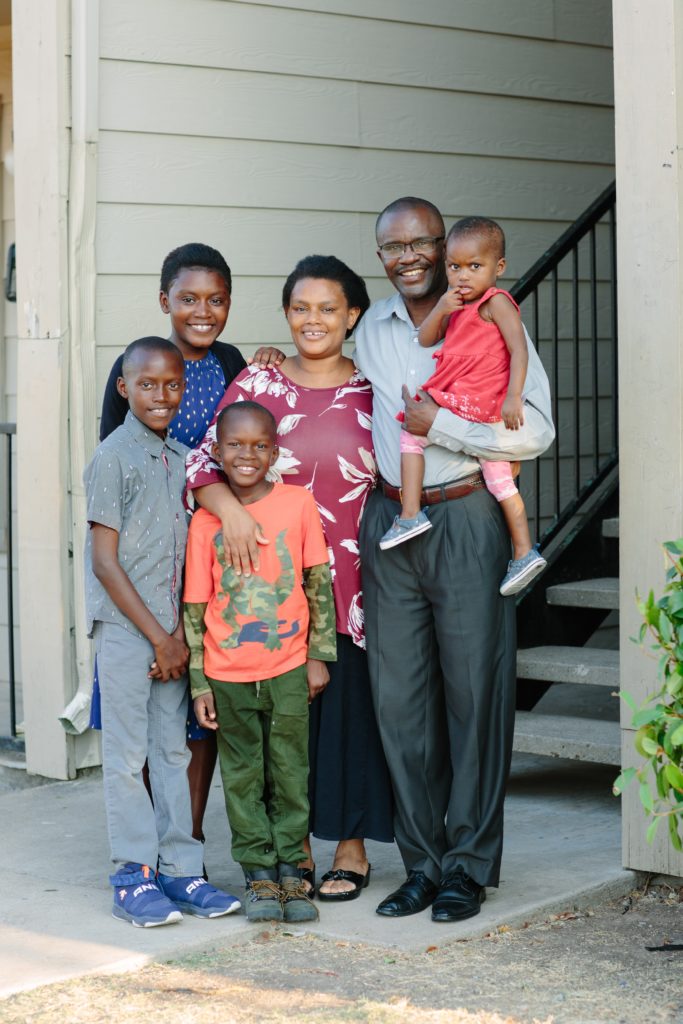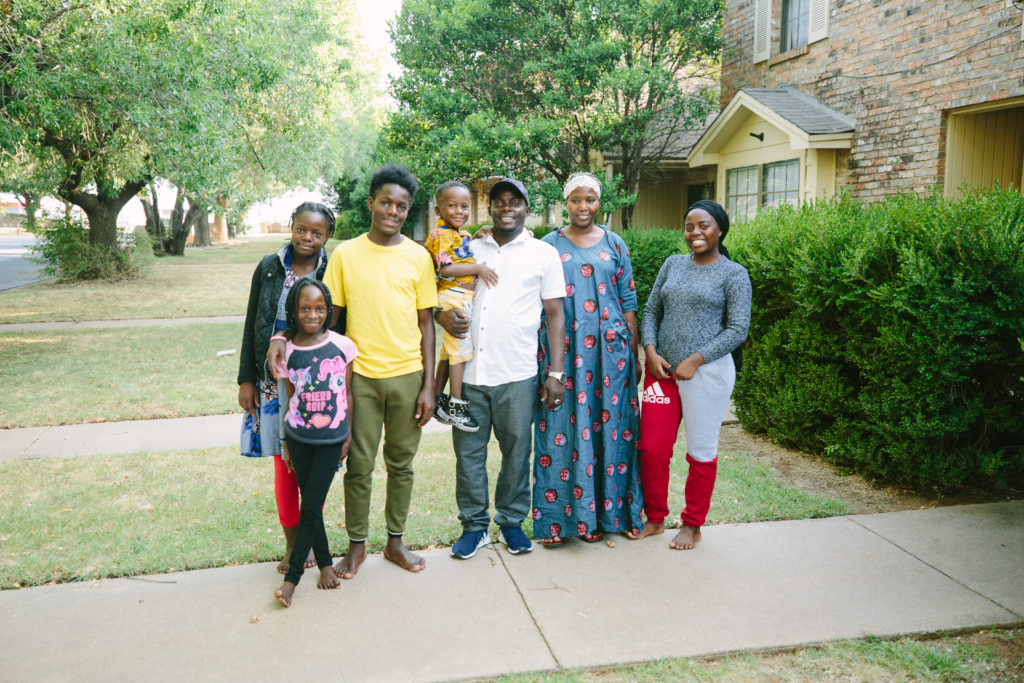“Fireworks!” 12-year-old Bright Kabura says as he describes a holiday celebration.
He’s not describing the 4th of July or New Year’s Eve – he’s describing Christmas in Zambia, where he and his family lived before coming to Abilene as refugees in December of 2016. Like many refugee families in America, the Kabura family has adopted some American traditions for the holidays along with keeping traditions from the countries they left behind. How refugee families celebrate in Abilene.

The Kabura Family
The Kabura Family includes Albert and his wife Happiness Yohanna, Rebecca (15), Bright (12), Kevin (8), and Prisca Irako (2). They lived in Zambia for 15 years as refugees from political unrest in Burundi. As Christians, they celebrated Christmas and Easter with their church in Lusaka, the capital city of Zambia. The father, Albert, said families would spend time shopping to prepare for the holidays, just like in America.
“There’s new clothes for the kids and new shoes,” Albert said.
When they first arrived in Abilene, it was just in time for Christmas, and their church, Northwest Church of Christ gave toys to all four kids.
“Here we got more presents,” said Bright. “I got a bike, shoes, a soccer ball.”
The Christmas celebration in Zambia starts with a church service at midnight on Christmas Eve followed by a day of feasting and celebration, not just with their immediate family, but also with friends and neighbors.
“We eat chicken, rice, beef…” listed Albert’s wife, Happiness Yohanna.
“Then we call all our neighbors to enjoy together,” Albert said.
In Abilene, it’s harder for them to share the celebration with their neighbors, said Albert. He doesn’t drink alcohol like many of his neighbors do, so he said they don’t all come together to eat and drink at the holidays.
The children were less than impressed with one specific American tradition – Santa Claus. Bright and his 8-year-old brother, Kevin, roll their eyes and laugh at the idea.
“He’s not real!” Bright shouts. “It’s just the parents who bring presents to their kids!”
The most surprising American holiday for 15-year-old Rebecca was Halloween.
“I didn’t know that people would dress up and get candy,” Rebecca said, laughing.
At first, the children didn’t like American food very much, Albert said. But after three years in America, they now like American food better than African food.
At the same time, they kept their African traditions by starting an African service at their church. After seeing many other Africans at Northwest Church of Christ, Albert decided to start an African service that meets right after the church’s regular service. And on Christmas Eve, they continued the tradition of a midnight church service, followed by a day of feasting and a second service in the afternoon on Christmas Day.
Susanna Lubanga, resettlement coordinator for the International Rescue Committee, said almost 98 percent of the refugee families are Christians and many of them connect with African churches in Abilene.
“Their faith has let them endure things I think most of us can’t even imagine,” Lubanga said. “And they’ve come out stronger.”

The Shabani Family
It’s been just one year since the seven members of the Shabani family left a refugee camp in Malawi to come live in Abilene. Bahati and his wife, Hawa-idi, fled from Burundi and lived in the refugee camp for 16 years with their children – Irankunda Natasha (17), Billy Mabarak (15), Nasma (12), Nasra (7) and Nasri “Bamba” (3). Before coming to America, they watched movies like “Home Alone” that gave them an idea of what American Christmases would be like.
“In movies, everyone is rich,” Billy said.
“But there is poor man, like in Africa,” Bahati said, explaining what surprised them the most about America. “There’s nice people here. It’s a quiet place.”
Although they experienced their first snow and winter season when they came to Abilene, it was the Abilene summers they found surprisingly hot.
“Even the hot in Africa is not as hot as Abilene,” Hawa-idi said.
The family’s favorite food for special occasions is pirao, brown rice mixed with spices, often served for weddings, parties, birthdays and holidays. Instead of wrapping gifts in wrapping paper, the Burundi people give gifts for special occasions in hand-woven baskets. The Shabani family keeps several of these small baskets around their house now to hold small items like earrings or keys. They also still use woven trays for carrying food and small, woven fans -called agasekes – hanging on the walls for decorations.
While they lived in Malawi, the Shabani family celebrated a Muslim holiday called Idi and Christmas with their Christian neighbors.
“In Africa, you invite your neighbor,” Bahati said. “Muslims celebrate with Christians.”
With no mosques in Abilene and not a lot of Muslims, Bahati said it can be hard for them to celebrate Idi. They still celebrate with eating and drinking, he said, but it’s smaller than it was in Africa, and they wish they could celebrate with more people.
During their first year of arrival, the IRC helps families celebrate American holidays with food baskets at Thanksgiving and parties and gifts for Christmas. Lubanga said each new family gets “adopted” by an Abilene family they all come together for a big Christmas party at a local church. The party is full of American traditions like Santa Claus, cookie-decorating, and gift-giving.
Some of the kids are shy around Santa Claus, but other kids get excited, Lubanga said. Many of the families celebrated Christmas in refugee camps in Africa by attending a church service and having a big meal but rarely with gift-giving.
“A lot of kids are so touched by getting a gift,” Lubanga said. “Some of the kids tell us they’ve never had a present in their life.”
Susanna brings her own children with her when she delivers Thanksgiving baskets full of food to the refugee families. She says it’s one of her favorite days of the year because she enjoys seeing the reactions of the refugee children when they see the food basket and realize that they get to celebrate just like their school friends.
“They’re proud to be in America,” Susanna said. “They often have an American flag in their house.”
This year the IRC will have three community dinners for holidays. The first dinner in October will feature traditional Congolese meals and will be open to the public. The second dinner in November will be primarily to connect troops from Dyess Air Force Base with refugees from Afghanistan and Iraq who worked with American forces overseas. Lubanga said a few of these refugees helped translate for American forces and that put them in danger so they had to flee to America.
“They feel an instant connection with the troops,” Susanna said.
The third dinner will be the Christmas party for sponsor families to meet the refugee families.
If you want to donate or participate in either of these events, contact the IRC at 325 675 5643. For the Thanksgiving event, Susanna said donations are accepted through the Friday before Thanksgiving. The IRC will accept Christmas family sponsors through December 10.
This is how refugee families celebrate in Abilene. How do you celebrate?
_____________________________________________________
How Refugee Families Celebrate in Abilene
by Haley Remenar
Photography by Beth Dukes





























Leave a Reply